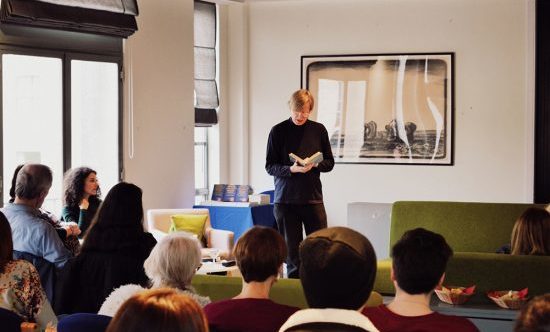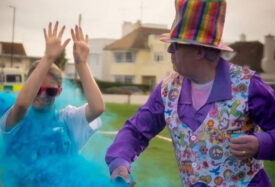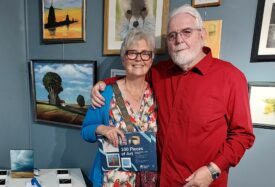Michel Faber on love, loss and end of life

What does it mean to write and to talk openly about death, grief and the end of life?
Writer and poet Michel Faber explored these issues during Dying Matters Awareness Week 2017 at an event hosted by Pilgrims Hospices and the School of English at the University of Kent.
In 2014, Michel’s wife, Eva, died after a long battle with multiple myeloma, a form of bone marrow cancer that is unpredictable and different for everyone. Before Eva’s illness Michel had only ever written fiction, but shortly before her death he began to write poetry. These poems – three written before Eva died and the rest afterwards – form his collection Undying: A Love Story (2016), which he read from at the event.
All I can do, in what remains of my brief time, is mention, to whoever cares to listen, that a woman once existed, who was kind and beautiful and brave, and I will not forget how the world was altered, beyond recognition, when we met.Michel Faber
Michel’s poems chronicle their journey as a couple, from Eva’s initial diagnosis until after her death. In [indecipherable] kappa he recalls being ‘sick with terror’ when they returned from the local clinic after receiving the news. A final poem, Purring, reflects on the night that Eva died. What comes across most strongly throughout the collection is the enduring nature of love.
Asked what had made this experience expressible as poetry, Michel said:
“The poems came to me when Eva died; it seemed odd not to share them if they would resonate with others. They are unguarded and direct, so turning them into fiction felt disrespectful. Eva’s death gave rise to poetry, but I don’t feel I will write poetry again.”
After the reading, Dr Stella Bolaki chaired a panel discussion and Q&A. Stella is a Senior Lecturer at the University whose research interests include illness narratives and how the arts can help medicine to be more humane. She was joined by Theresa Rowlstone from the clinical team at Pilgrims.
Michel shared some of Eva’s own artwork produced in the last years of her life. She was a painter, photographer and writer, a legacy that Michel is keen for others to recognise. Her work included photography combined with medical scans of her body, and a poem – The Beauty of Beeping – about the ‘machines who sing all the time’ during chemotherapy treatment. Michel highlighted how Eva was ‘most creative when she was most disabled’:
“When you’re a creative person you tend to procrastinate, but Eva didn’t have many more tomorrows so she was intensely creative in the late stages.”
He also highlighted the importance of being creative at milestones like birth and death.
Art therapy at Pilgrims allows people to trace their journey through drawing or painting. Creative writing and memory boxes are also a practical way for people to tell their story and leave a legacy.Theresa Rowlstone, Advanced Nurse Practitioner at Pilgrims Hospices
Stella asked whether hospice patients feel a need to tell their story, too. Theresa agreed:
“Art therapy at Pilgrims allows people to trace their journey through drawing or painting. Creative writing and memory boxes are also a practical way for people to tell their story and leave a legacy.”
In response, an audience member shared a story about their friend who had passed away at Pilgrims Hospice Ashford. They had never painted before, but experienced a beautiful spiritual journey through painting at art therapy sessions offered by Pilgrims.
Michel agreed and recognised that – in an age of constant recording on digital devices – it’s important to have tangible things that people leave behind so we can hold them in our hands and truly experience them and remember.
We host Time to Talk community events throughout the year for the general public, aiming to open up the conversation about death and dying; with film screenings, poetry readings and Death Cafes and much more, there’s something for everyone.
Check out our upcoming event:
- The Denial of Death: How to overcome our fear of dying, Tuesday 23 October 2018
To find out more about future Time to Talk events contact the Education team on 01227 812 616 or email [email protected].


